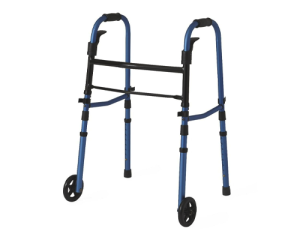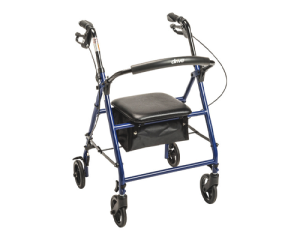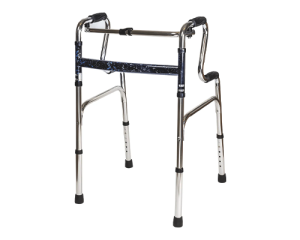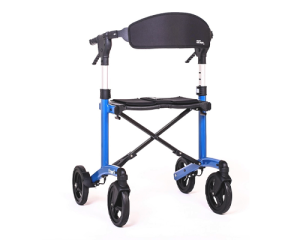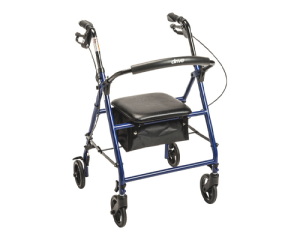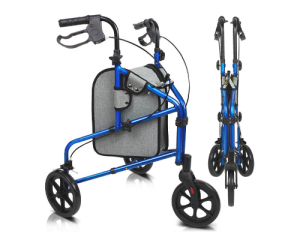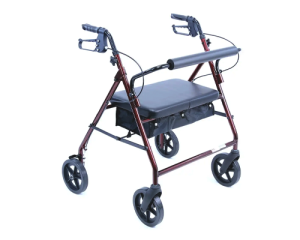- Price: $62, but may vary depending on the dealer
- Wheels: Zero, but comes with additional legs to convert into a two-wheel walker
- Handle height range: 32–39 inches (′′)
- Weight capacity: Up to 350 pounds
- Product weight: 6.8 pounds (8 pounds heavier with wheels installed)
7 Best Walkers & Rollators: Reviewed & Tested in 2025
Key Takeaways
- We didn’t select a “Best Overall” pick because each walker and rollator caters to a different set of mobility needs.
- Walkers and rollators in our review cost between $60–$500, depending on the brand, dealer, and features.
- Talk to a health care provider to determine which mobility aid is best for you.
Best walkers and rollators in 2025
- Medline Blue Compact Folding Paddle Walker With Wheels: Best Walker for Older Adults With Balance Concerns
- Drive Medical Folding Steel Rollator With 6″ Wheels: Best Rollator With a Seat
- Carex Sturdy Uplift Adjustable Folding Walker With Stand-Assist Design: Best Stand-Assist Walker
- Triumph Mobility Escape Premium Folding Portable Rollator: Most User-Friendly Rollator
- Drive Medical Dual Pad Steerable Knee Walker With Basket: Best Knee Scooter
- Vive Health Three-Wheel Walker Rollator: Best Three-Wheel Rollator
- Karman Lightweight Extra Wide Rollator: Best Heavy-Duty Rollator
What we look for in the best walkers and rollators
For this review, we found several important factors when researching walkers and rollators.

Value
We prioritized options with necessary features and sturdy materials at a fair price.

Practicality
We looked for portable options that are relatively lightweight with easy-to-use features.

Variety
Our list has different types of walkers and rollators, so you can compare options and determine which is best for your mobility needs.

Durability
Our options are made primarily of aluminum or steel and have good weight capacities (at least 250 pounds), so they’re designed to last.
Medline Blue Compact Folding Paddle Walker With Wheels: Best Walker for Older Adults With Balance Concerns
Our expert take on the Medline Blue Compact Folding Paddle Walker
Our team loves the Medline Blue Compact Folding Paddle Walker because it can convert from a standard walker to a two-wheel walker by disconnecting the two standard legs on the front of the walker and attaching the included wheeled legs instead. Standard legs feel more stable, while wheels allow the walker to slide more smoothly as they move.
Changing the walker’s design can provide more or less stability as needed. If your imbalance changes or improves with rehabilitation, you can switch out the legs to provide more or less assistance. This is also helpful if you need a different amount of stability depending on where you are and what you’re doing, like walking to the mailbox. But if you have a condition that affects your dexterity, like arthritis, you may find swapping the legs to be difficult. It may be better to have different walkers available at home.
Our team also likes this walker because it’s lightweight, portable, and affordable. It weighs less than 10 pounds and uses a large paddle lever system to fold it up. We found that its paddle lever made it easier to fold compared to the smaller button-like systems that standard walkers have. And unlike other walkers, the legs also fold up to be more compact. It also costs $20–$40 less than most standard or rolling walkers we’ve seen during our research. This is a great value because you get two types of walkers in one device.
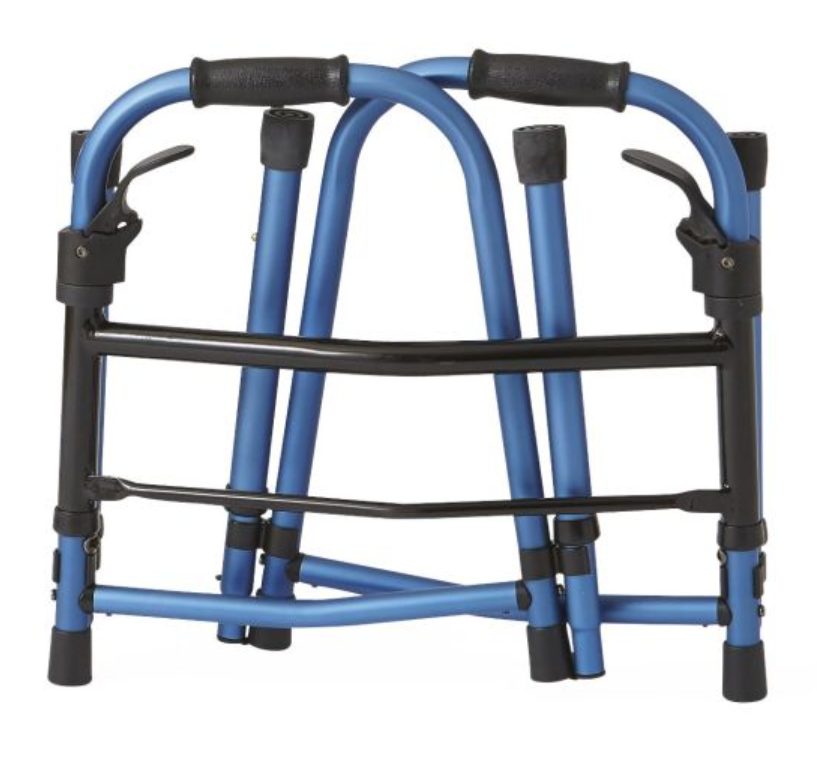

Our tester on the Medline Blue Compact Folding Paddle Walker:
“It’s hard to find a negative about this walker. It has a great value and is versatile. My only complaint is that it only comes in one blue color. Other walkers have a few color options, so you can personalize it to fit your style.”
Our mobility expert’s take
Who may love it
- People with balance issues who benefit from the stability of a walker for slow, short-distance walking around the home or community
- Those who have fluctuating symptoms and may benefit from a standard walker one day, then a two-wheel walker the next
- Anyone who is undergoing rehabilitation and may benefit from converting their standard walker to a rolling one over time
Who may want to avoid it
- Those with dexterity issues (poor hand coordination, weakness, or pain) may find it difficult to install the wheels when necessary
- People who may not recognize the need to switch between device modes
- Those who want a more personalized design, like more color options
Customer reviews on the Medline Blue Compact Folding Paddle Walker
Reviews for this product are generally positive. According to Google’s list of product reviews from online stores (like 1800Wheelchair or Vitality Medical), the product has a rating of 4.7 out of five stars with more than 70 reviews.
“This walker really helped me while I was recovering from total knee replacement surgery. It was easy to fold and unfold as needed. Also is sturdy as I am a plus size person. I have a friend who is having knee surgery next month and have recommended this walker.”
— Lisa, buyer in April 2024
“Love it. Great looking and easy to use and fold”
— Marcella S., buyer in September 2023
We only saw four negative reviews mentioning wobbly legs or a smaller-than-advertised size, but they were from three to six years ago.
Drive Medical Folding Steel Rollator With 6′′ Wheels: Best Rollator With a Seat
Our expert take on the Drive Medical Folding Steel Rollator
A rollator might be a good option if you can walk longer distances but feel unsteady as you get tired. Depending on your mobility level, it may provide enough stability to help you feel safe walking around your neighborhood or going to the mall. But a rollator with a seat can be useful when you need a break.
We like the Drive Medical Folding Steel Rollator because it has a simple design that’s good for everyday use. Its steel frame weighs about 17 pounds, about five pounds heavier than similar aluminum options, but it is more durable for transport and outdoor use. Most importantly, it has a 12-inch square padded seat and backrest, allowing you to sit and rest your legs periodically. This is handy in community spaces, like the grocery store, where seats are hard to find.

Before sitting on your rollator, always lock the wheels using your brake handles to avoid a fall. This rollator uses a responsive brake system at the handles to comfortably brake the device when needed. This design is easy to control, even with dexterity issues. Push the brakes down as far as you can to lock them in place. You should hear a dull click when you reach the end of their range, which typically indicates the brakes are working.
The seat doubles as a storage compartment for a purse or other belongings. But unlike some rollators we’ve seen that use a basket, this enclosed design keeps your belongings partially hidden behind black fabric.
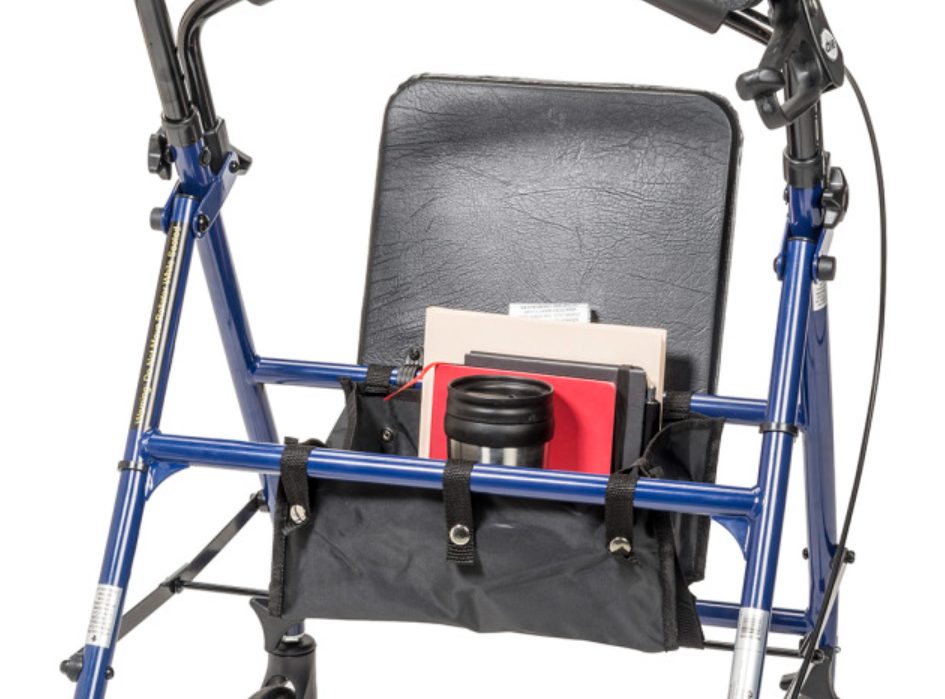

Our tester on the Drive Medical Folding Steel Rollator:
“I like how this is a simple, durable, portable design. It may be slightly heavier than other options, but it’s designed to last. And the whole rollator, including the seat, easily folds away to fit in the back of a car.”
Our mobility expert’s take
Who may love it
- People who can walk longer distances but need an assistive device for stability
- People who find themselves looking for a seat as they get tired while running errands
- Those who feel more stable pushing their belongings (like a purse or oxygen concentrator) in a rollator rather than carrying them
Who may want to avoid it
- People with moderate to severe mobility issues who need a more stable option
- Those who regularly navigate tight spaces with an assistive device, since this has a larger turning radius than three-wheel options
- People who prefer or need to walk at a slow pace, since rollators are known to glide more easily and faster than front-wheeled walkers
Customer reviews on the Drive Medical Folding Steel Rollator
Among Google’s list of product reviews from online stores (like Canada’s Store or Home Medical Equipment), the product has a rating of 4.3 out of five stars with more than 115 reviews. Most people were happy with their rollator, sharing stories of how it’s improved their lives (or the lives of someone they care for).
“This is a good economical walker. Solid enough to fully support an individual with a handicap. With a 3 level home we needed 3 walkers to allow independence. We already had one, borrowed a second & this provided the third. Good locking brakes easy maneuverability. Comes mostly assembled which is a bonus.”
—SUPRK, buyer on 1/1/2024
“Bought this rollator for my 92 year old mother, and she loves it! Easy to handle, rolls very well and brakes are good. Light also, which makes it easier to transport. Very little assembly required. Definitely recommend.
—Diane, buyer on 2/72023
Only a few people were disappointed in their purchase, citing failed welds in the frame or broken brakes after some use.
Carex Sturdy Uplift Adjustable Folding Walker With Stand-Assist Design: Best Stand-Assist Walker
Our expert take on the Carex Sturdy Uplift Adjustable Folding Walker
Standing from a chair, especially a soft couch or a low armchair, can be challenging for those of us with painful joints or leg weakness. The Reviews Team likes how the Carex Sturdy Uplift Adjustable Folding Walker design is much safer than a standard or wheeled walker because there are two sets of handles: an upper set and a lower set. The lower handles allow you to push down on the device to stand up, which feels more stable—pushing down on tall handles when moving from sitting to standing can make the device more likely to tip.

Although this design is safer for standing up, it’s not the most stable option. A walker is less stable than a couch’s arms (for example), so pushing off your seat from a heavy, stable couch may, at times, be easier and safer than relying on a lighter, nonstationary fixture like a walker. It’s important to talk to an occupational or physical therapist to learn how to use this walker safely and to understand when it’s most appropriate to use it.
Our team also likes the aluminum frame, which is lightweight and easy to transport. It weighs about 6 pounds. It also folds away for storage or transport, but the release button in the middle of the top bar is smaller and more challenging to press than the Medline Folding Paddle Walker in our review.
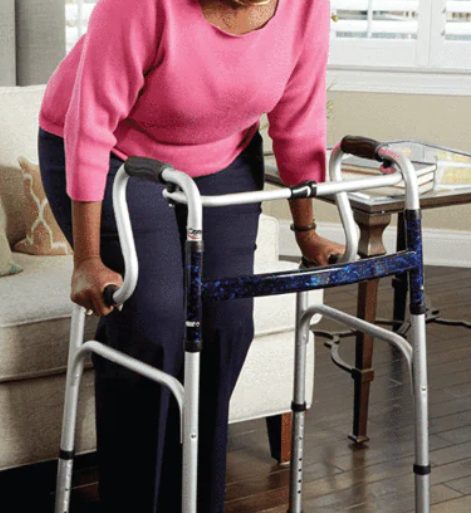

Our tester on the Carex Sturdy Uplift Adjustable Folding Walker:
This walker has a thoughtful design, but you need to know how to use it safely. I like how the bottom handles have a nice grip to push yourself up because placing so much weight on your hands and wrists can be uncomfortable.
Our mobility expert’s take
Who may love it
- People with lower body weakness or hip, knee, or foot pain who need assistance to stand up
- Those who have consulted with their health care provider on how to use this walker safely
- People who need a stable walker to navigate their home or short community distances safely
Who may want to avoid it
- People who have upper body weakness or hand, wrist, or shoulder pain and can’t push themselves up to standing
- Those who may have difficulty remembering when to use the lower set of handles versus the higher set of handles, posing a safety issue
- Those who need a heavy-duty option to support their weight
Customer reviews on the Carex Sturdy Uplift Adjustable Folding Walker
There aren’t many reviews online for this walker, so it’s difficult to understand customer satisfaction. According to Google’s list of product reviews from the brand and online stores (like Senior.com or eBay), the product has a rating of 4.5 out of five stars with 17 reviews. Most are over a year old but share overall positive experiences with their walker.
“[…] I like doing my PT on the sand to help balance. The special handles help me get up and down much easier and the walker is lightweight. I’ve been through four of these, already on my 4th. Love it! The top button design could be better and the handgrips are causing me allergies. That’s why no 5 stars.”
— C., buyer on 4/8/2024
“This is the greatest walker. I’m so thankful it was designed. I have no balance and this was a godsend for me. It’s so lightweight and easy to fold beside my chair. I don’t block the walkthrough.”
— Happy, buyer on 7/5/2023
Triumph Mobility Escape Premium Folding Portable Rollator: Most User-Friendly Rollator
Our expert take on the Triumph Mobility Escape Premium Folding Portable Rollator
We like the Triumph Mobility Escape Premium Folding Portable Rollator because it has three height options for different body types. Depending on the seat height you purchase, the handle height range is between 28 and 40 inches, the largest range of all the assistive devices in this review.

We asked Schreier, the New Jersey occupational therapist, to explain how to fit a walker or rollator to your height. “There’s variability between everyone,” she said, “but, generally speaking, when standing with your shoulder relaxed and arms hanging loosely at your sides, the hand grips of the walker should line up with the crease in your wrist.” If the handles are too high, you might feel like you’re shrugging. But if they’re too low, you may feel hunched over.
It also has more comfort features (and optional add-ons) than a standard rollator. Its versatile design includes large wheels with anti-shock foam for smoother use outside, and its brake system locks in place with minimal effort. You also get a padded seat with a wide backrest, more like a regular chair, for added cushion and support.
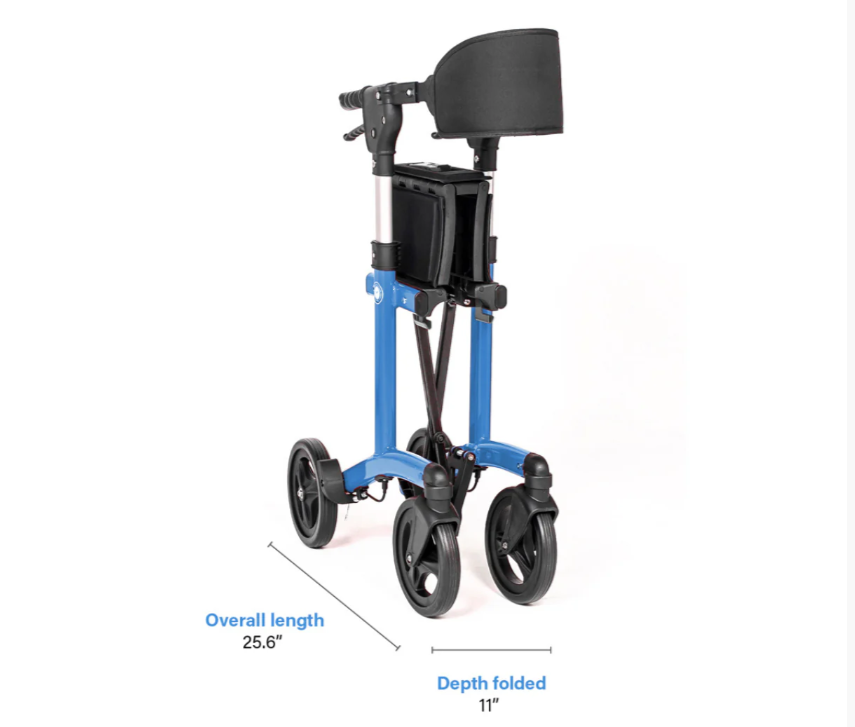
The Triumph Mobility Escape Premium Folding Portable Rollator comes with a storage tote (or “shopping bag”), but you can add more features and attachments, like a cupholder, tray, or cane holder, to free your hands and carry useful items. You can also add “slow-down brakes,” which allow you to limit how quickly the wheels roll. The brakes are ideal for people who need to walk slower to remain stable.

Our tester on the Triumph Mobility Escape Premium Folding Portable Rollator:
I like that I can set this rollator to fit my height closely so I can stand more upright and put less weight through my hands and wrists. I also like how the handles are angled slightly—It’s a small detail, but it’s designed to feel better on the wrist as I walk.
The only negatives our team identified were its cost and size. This rollator is a taller, more modern design, costing a few hundred dollars more than a standard option. But it is more versatile than a standard rollator, so you may get more use out of it, especially in tight spaces. Even though it folds into a convenient shape, it’s taller and bulkier to store. Luckily, it’s relatively lightweight at about 15–16 pounds, depending on the height range you order.
Our mobility expert’s take
Who may love it
- People who want a device that provides stability and comfort while walking long distances
- Those who want a safe and convenient way to walk outdoors, like at a park, while keeping their belongings with them
- Those who want a device that works well in both wide and narrow spaces
Who may want to avoid it
- Shoppers on a budget
- People with moderate to severe mobility issues who need a more stable option
Customer reviews on the Triumph Mobility Escape Premium Folding Portable Rollator
There aren’t many reviews online for this walker, but from the reviews we found, all are positive. According to Google’s list of product reviews from the brand and online stores (like Senior.com and Mobility Nest), the product has a rating of five out of five stars with 27 reviews. The most common theme among reviewers was how much they loved how it fit a wide range of needs.
“This rollator is a great success for me because it suits my long arms and legs, has a seat that’s higher than any in waiting rooms, and is sufficiently light that I’m able to get it into our SUV. What more could I ask for? Everyone admires it, too!”
— Jane H., buyer on 5/7/2024
“I have tried many rollators and this is the only one that fits me like a glove. This is my second one purchased. If buying this one, I recommend buying the cane holder and slow down brakes. You’ll need them. ”
— Anonymous buyer on 4/17/2024

If you’re looking for the tallest rollator possible or a “stand-up” walker, we recommend you consider the Drive Medical Elevate Upright Walker. This option has a handle height range of 48–53 inches and allows you to walk more upright or rest your elbows on the handles.
Drive Medical Dual Pad Steerable Knee Walker With Basket: Best Knee Scooter
Our expert take on the Drive Medical Dual Pad Steerable Knee Walker
Some people need a temporary solution while healing from a foot or ankle injury. Knee walkers (or knee scooters) are a great alternative option to crutches and walkers because you can rest your leg on the scooter’s pads, which allows you to walk (or scoot) with less effort from the upper body. But not all knee scooters are built the same.
Our team loves the Drive Medical Dual Pad Knee Walker because it has a longer cushioned area to better support your shin and knee as you walk. Some other scooters only have one flat pad to support your injured leg, but this option has two contoured pads to help relieve pressure. The pads and handlebars are adjustable to fit your height.
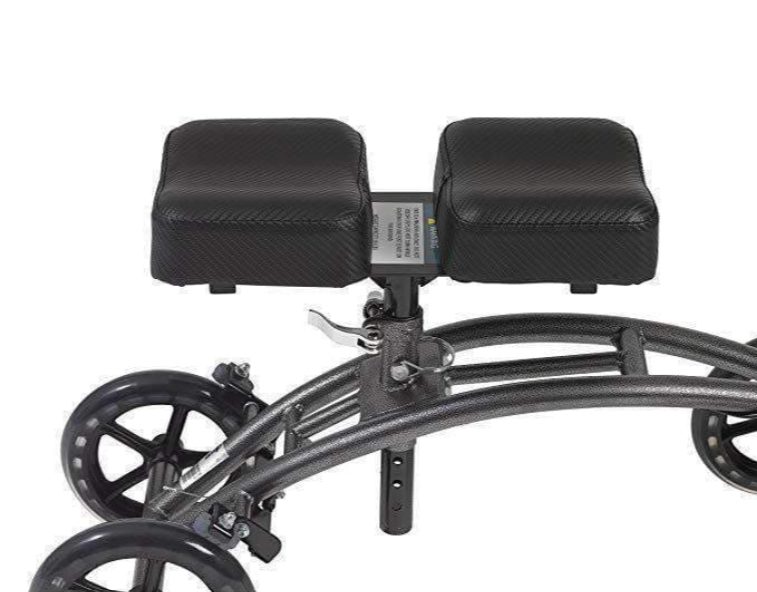
We also appreciate how this knee scooter has large 7.5-inch wheels to navigate outdoor areas with a brake system behind the handles, like a bike. You also get a large basket attached to the front to store your things and keep your hands free for steering. And if you need to stow your knee scooter in the trunk of a car, you can fold it at the base of the handle pole, although it’s not compact. It’s more awkward and bulky to lift compared to other assistive devices.

Our tester on the Drive Medical Dual Pad Steerable Knee Walker:
“I like the Drive Medical Dual Pad Knee Walker because the pads are designed to be more comfortable than other options on the market. But this device isn’t for every condition. To use it properly, you have to coordinate steering the scooter like a bike while resting your knee and shin on the pads. But I find it more comfortable than using crutches or a walker.”
Our mobility expert’s take
Who may love it
- People who need to take weight of their foot or ankle injury
- Those who prefer not to rely on crutches or a walker as they heal from their injury
- People who need a comfortable assistive device to navigate longer community distances with a lower leg injury
Who may want to avoid it
- People who need to navigate tight spaces or stairs
- People who also have injuries in both legs, as you will need one functional leg to propel the walker
- People who have arthritis, an active knee injury, or knee pain that may be provoked by kneeling on the scooter
Customer reviews on the Drive Medical Dual Pad Steerable Knee Walker
This knee scooter is popular online with high ratings over the last few years. According to Google’s list of product reviews from the brand and online stores (like Walmart or 4MD Medical Solutions), the product has a rating of 4.4 out of five stars with more than 460 reviews. Many people are happy with their purchase and reported an easier recovery after buying it.
“I had ankle surgery and am non weight bearing. This scooter makes life 10000000 times easier. It’s sturdy, stable, easy to collapse, easy to use.”
— Anonymous buyer on 3/27/2024
“Very useful equipment. After surgery, I couldn’t weight bear and I found the knee scooter easier than crutches to get around. Light weight and easy to maneuver. One improvement I would suggest is to put a break (not the hand brake) on so it would stationary to rest one leg on it.”
— Liz, buyer on 10/14/2023
There are a few negative reviews online stating how the scooter’s wheels were large but not thick enough for carpets and can feel difficult to steer, especially on rougher terrain. This scooter is best for smoother surfaces, but there are all-terrain scooters, like the Vive Health All Terrain Knee Walker (which starts above $300).
Vive Health Three-Wheel Walker Rollator: Best Three-Wheel Rollator
Our expert take on the Vive Health Three-Wheel Walker Rollator
Standard four-wheel rollators can be helpful for those who want to feel stable walking long distances, but they aren’t always easy to move around. They can be bulky as well, making it difficult to navigate through crowds or smaller community spaces. In contrast, three-wheel walkers like the Vive Health Three-Wheel Walker Rollator are designed to have a tighter turning radius and easier handling.
This device is a less stable option than a standard rollator and doesn’t include a built-in seat, but it can still provide minor assistance to people who feel most secure walking with support. We love how it includes a gray tote bag and three color options for a more modern look. It also has an ergonomic brake system (similar to the Drive Medical and Karman rollators) for simple control and has a wide adjustable handle height range to fit different body heights.
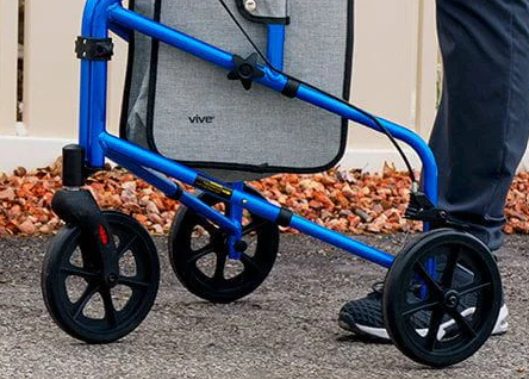
Our team also likes how this rollator is easy to store. Its aluminum frame weighs only 11 pounds and measures only 9 inches in width when folded up, so it can stow away easily in a closet or trunk of a car.

Our tester on the Vive Health Three-Wheel Walker Rollator:
“This three-wheel walker feels more compact and mobile compared to a standard rollator. It’s also priced fairly compared to other options. It can be up to $200 less than a standard rollator and around $100 less than similar products we’ve researched. And the colors are fun!”
Our mobility expert’s take
Who may love it
- People who prefer to have a little bit of assistance when walking long distances
- People who navigate tight spaces or crowds often
- Those with minimal mobility issues
Who may want to avoid it
- People who feel more balanced using a four-legged standard rollator, especially on turns
- People who need a built-in seat
- Those who may benefit from a more stable device, like a standard or rolling walker
Customer reviews on the Vive Health Three-Wheel Walker Rollator
This three-wheel walker has a rating of five out of five stars with more than 30 reviews on Vive Health. All reviewers were satisfied with their purchase, reporting how it’s simple to use and feels well-built.
“Terrific, compact, easy to stow while on the go!!”
— Anonymous buyer on 5/13/2024
“I feel very comfortable with this product even though it is lightweight. I may order the cup attachment for the warmer weather. The service at Vive has been very helpful too.”
— Maggie D., buyer on 3/4/2023
While there are a few negative reviews on Google, most reviewers agree that this product has been useful. We only found one reviewer who wanted to return the item but hadn’t heard back from the dealer.
Karman Lightweight Extra Wide Rollator: Best Heavy-Duty Rollator
Our expert take on the Karman Lightweight Extra Wide Rollator
“Heavy-duty” rollators often refer to a strong frame with a weight capacity of at least 300 pounds. While many of our choices have a high weight capacity, this is the only rollator on the list that can carry up to 400 pounds.
The frame has a 22-inch wide space between the handles to provide as much seating space as possible for higher-weight body types. If the backrest bar feels restricting, you can easily remove it.
Although the design is larger, its aluminum construction is lightweight for easy transport. For reference, our standard steel rollator in this review weighs about 17 pounds, while this Karman rollator weighs only three more pounds. If you’re concerned that the aluminum frame won’t feel durable enough, there is a steel version with the same weight capacity for $30 less, but it weighs almost 25 pounds and can feel slightly more difficult to transport.
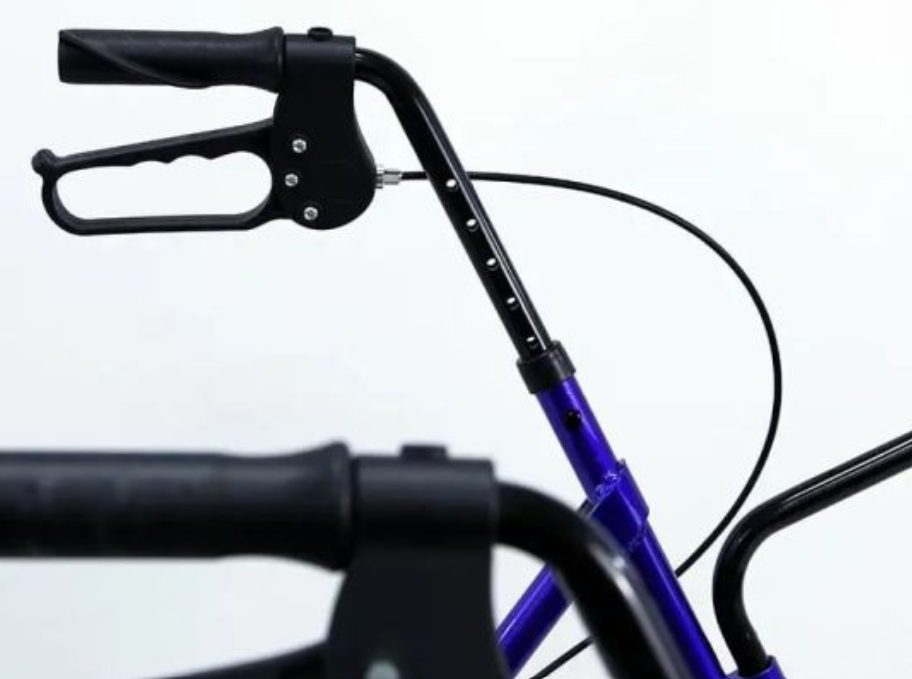
Like the Drive rollator, the Karman Lightweight Extra Wide Rollator has basket storage under the seat. If you prefer a hidden compartment, a tote accessory is available, but you need to add it to your purchase for about $70 more, depending on the dealer.

Our tester on the Karman Lightweight Extra Wide Rollator:
“Even though this rollator has a larger design, it’s still simple to fold up. I like how you can remove the basket storage if you need more legroom as you walk.”
Our mobility expert’s take
Who may love it
- Higher-weight people who need a rollator with a high weight capacity to feel stable as they walk, especially longer community distances
- People who find themselves looking for a seat as they get tired while running errands
- Those who feel more stable pushing their belongings in a rollator rather than carrying them
Who may want to avoid it
- People with moderate to severe mobility issues who need a more stable option
- Those who regularly navigate tight spaces with an assistive device (it has a larger turning radius than three-wheel options)
- People who weigh less than 300 pounds and will feel comfortable using a standard rollator
- People who prefer or need to walk at a slow pace, as rollators are known to glide more easily and faster than front-wheeled walkers
Customer reviews on the Karman Lightweight Extra Wide Rollator
It’s difficult to gauge customer satisfaction with this product because there are limited reviews online, and many are dated. According to Google’s list of product reviews from the brand and online dealers (like 1800Wheelchair or Medical Supplies Now), the product has a rating of 4.4 out of five stars with more than 23 reviews. Only one reviewer gave one star, stating that the product was broken upon delivery.
“First walker lasted eight years so bought another one just like the first one!!!”
— Grayfox37, buyer in 2021
“This equipment was very easy to assemble. It was also very easy to adjust to me. Quality of the workmanship of this equipment is fantastic. It fits through my doorways easily and goes over the threshold easily. Very pleased with this gift […]”
— Deb T, buyer in 2020
How we research walkers and rollators
Our Reviews Team has dedicated more than 200 hours to evaluating mobility products like walkers and rollators. We consulted at least six health care professionals and researched roughly 25 brands. We’ve also surveyed 1,400 recent buyers to understand their experiences shopping for mobility aids.
Rollators and walkers we research are evaluated for such characteristics as simple functionality, portability, cost, and other aspects many shoppers consider, according to our survey results.
What is the difference between a walker and rollator?
Walkers and rollators are mobility devices designed to help you keep your balance while walking. The type of walker or rollator you choose depends on the assistance you need.
- Standard walker: This option is the most stable. It has four legs without wheels, so the person using it has to feel comfortable picking it up with each step. It can be helpful for some balance conditions or people recovering from certain procedures (like a hip or knee replacement) where placing weight through the leg is weak or painful. It’s best for smaller distances, like navigating the home. These are also called walking or standing frames.
- Rolling walker: If you need the stability of a standard walker but smoother movement, a rolling walker is the best option. Rolling walkers have two to four wheels that roll along as you walk. They require less effort than a standard walker because you don’t have to pick them up, but they are not as stable due to the wheels. Since rolling walkers move only when someone pushes them, they do not have brakes. They come with levers that allow you to fold them for easy storage and transportation.
- Rollator: A rollator is best for those who need assistance walking longer distances, like in parks or shops. Although it’s less stable than a walker, it often has lockable brakes. And some options come with a seat, so you can take a break whenever needed. Rollators often have four wheels, but more compact options have three. Once a rollator is assembled, it does not fold down like walkers do.
Other mobility aids provide a similar amount of assistance. For example, knee scooters could be a convenient option for those with ankle or foot injuries who prefer not to use crutches. You can roll them without using too much upper body strength.

There is such a thing as “too much” assistance. “A device that provides too much stability might prevent someone’s natural movement and walking pattern,” said Schreier, the occupational therapist in New Jersey. In these cases, the body doesn’t have the opportunity to use its full potential and could lead to over-reliance on the device. This can be an obstacle for those recovering from an injury.
If you’re unsure what’s most appropriate for you, talk to a health care professional (like an occupational or physical therapist). They can evaluate your strength, mobility, and balance to determine the most helpful option. “Keep in mind that many states now offer direct access, in which you can seek therapy services without a physician’s referral. New Jersey is one state that has direct access for both physical and occupational therapy, which will enable you to fulfill your needs more quickly,” said Schreier.
If you’re looking for more permanent mobility solutions in the home, see our reviews of stair lifts or wheelchair lifts.
How much do walkers cost?
In our review, walkers and rollators cost between $60 and $500. The price depends on the brand, dealer, material, and number of features included in the mobility device. Your purchase often comes with a warranty, although coverage (and return policies) often depend on the dealer.
Walkers and rollators are typically covered by insurance, including Medicare Part B and Medicaid, as durable medical equipment (DME). Your physician must document it as medically necessary, though. Additional accessories, like cupholders and storage baskets, are not typically covered. These devices are also eligible purchases for those with flexible spending accounts (FSAs) or health savings accounts (HSAs).
Table 1, Compare walkers and rollators, as of 2025
| Price* | $62 | $107 | $100 | $480 | $290 | $160 | $260 |
| Wheels | Zero or two | Four | Zero | Four | Four | Three | Four |
| Handle height range (inches) | 32–39 | 31–36 | 30–37 | 28–40 | 31–40 | 31.5–38 | 35–39 |
| Weight capacity (pounds) | 350 | 350 | 250 | 300 | 350 | 250 | 400 |
*May vary depending on the dealer
Bottom line
The best walker or rollator for you depends on your budget and mobility needs. Standard rollators are best for people who want a lot of stability while walking shorter distances, while wheeled walkers and rollators provide mild to moderate stability while walking longer distances.
It’s best to talk to a health care professional to determine which walker is best for you. But if you’re unsure what to choose or your balance and mobility needs are changing, we like the Medline Blue Compact Folding Paddle Walker With Wheels. Other items on our list could be appropriate depending on your condition, but our picks should give you a good place to start in your search.
Frequently asked questions
Medicare Part B will cover any manual (non-powered) walker or rollator if a physician deems it medically necessary.
Since everyone’s mobility needs and balance conditions are different, the best walker is determined on a case-by-case basis. It’s best to get evaluated by a health care professional, like an occupational or physical therapist, to determine the best device for your needs.
Yes, doctors recommend walkers if they are medically appropriate. People who find it painful to walk or have mobility issues, balance problems, poor coordination, or weakness often benefit most. But there are many types of walkers that fit every need, so it’s best to receive guidance from a health care professional to find the best rollator or walker for you.
Questions? Email us at reviewsteam@ncoa.org.
Sources
- NCOA. NCOA Mobility Survey. 600 respondents. Conducted using Pollfish. Launched August 2024
- Centers for Medicare and Medicaid Services. Walkers Policy Article. April 26, 2024. Found on the internet at https://www.cms.gov/medicare-coverage-database/view/article.aspx?articleId=52503


